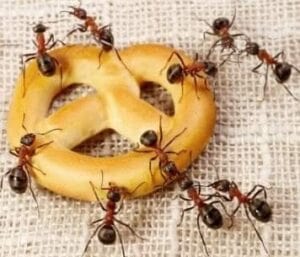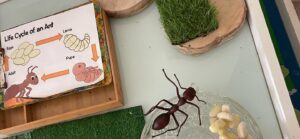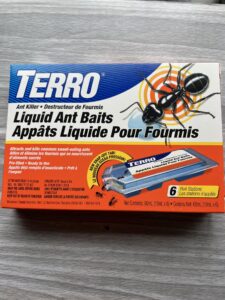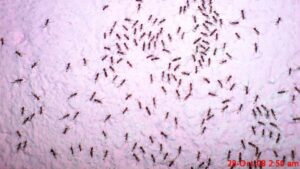Are you tired of seeing ants roaming around your mobile home? Ant infestations are a common problem that many mobile homeowners face. In this article Prevent Ant Invasions in Mobile Homes: Tips we will discuss all the problems that come with having ants in your mobile home.
Prevent Ant Invasions in Mobile Homes
These tiny pests can be difficult to control, and if left unchecked, they can cause significant damage to your property. Unfortunately, mobile homes are particularly vulnerable to ant infestations due to their construction and location.
If you’re dealing with an ant infestation in your mobile home, it’s essential to seek the help of a pest control company. They have the expertise and tools needed to identify the source of the infestation and eliminate it quickly.
We’ll cover topics such as fire ants and what you can do about mobile ants. We’ll also answer some common questions related to ant infestations in mobile homes, including who inspects them. So let’s get started!
Do you want to get rid of Ants in your home quickly. Visit this link for the best Terro Liquid Baits. Ants will take the poison back to their nests and it will get rid of your ant problems quickly.
Common Causes of Ant Infestations in Mobile Homes
Ants are a common problem for mobile homeowners. These tiny insects can quickly infest your home, making it difficult to enjoy your living space. But what causes ants in a mobile home?
Food and Water Sources: Prevent Ant Invasions in Mobile Homes
Ants are attracted to food and water sources. If you leave crumbs or spills on your floor, ants will find them and start to build their colony nearby. Similarly, if you have standing water or leaky pipes, ants will be drawn to the moisture.
To prevent ant infestations caused by food and water sources:
Clean up any spills or crumbs immediately
Store food in airtight containers
Fix any leaks or standing water issues promptly
Cracks and Gaps
Mobile homes often have small cracks and gaps in their walls, floors, and windows that provide entry points for ants. Even the smallest crack can be enough for an ant to squeeze through.
To prevent ant infestations caused by cracks and gaps:
Seal all cracks and gaps with caulk or weather stripping
Use screens on windows and doors
Repair any damage to your home’s exterior promptly
You might also be interested in our article: Ready to Assemble Kitchen Cabinets
Prevent Ant Invasions in Mobile Homes: Poor Sanitation
Poor sanitation practices can lead to ant infestations in mobile homes. If you don’t clean regularly or take out the trash frequently enough, ants will be attracted to the mess.
To prevent ant infestations caused by poor sanitation:
Clean regularly using soap and water
Take out the trash daily
Keep your home clutter-free
Ants are not only a nuisance but can also cause structural damage over time if left unchecked. By understanding these common causes of ant infestations in mobile homes, you can take steps to prevent them from occurring.
How Ants Enter and Establish Colonies in Mobile Homes
Ants are a common problem for many homeowners, and mobile homes are no exception. These tiny pests can enter your home through small cracks and gaps in the walls, floors, and foundation. Once inside, they can establish colonies in warm, moist areas such as kitchens and bathrooms.
Types of Ants That Invade Mobile Homes
There are several types of ants that may invade your mobile home, including carpenter ants, pavement ants, odorous house ants, and pharaoh ants. Carpenter ants are the most destructive type of ant because they can cause damage to the structure of your home by burrowing into wood to create their nests.
Where Do Mobile Ants Come From? Prevent Ant Invasions in Mobile Homes
Ants can come from a variety of sources. They may be attracted to food or water sources inside your home or may be seeking shelter from extreme weather conditions outside. They may also be brought in on plants or other items that you bring into your home. Knowing where the ants are coming from will help to prevent ant invasions in mobile homes.
How Ant Colonies Form: Prevent Ant Invasions in Mobile Homes
When an ant colony forms inside your mobile home, it typically starts with a single queen ant who lays eggs that hatch into worker ants. The workers then forage for food and water to bring back to the colony. Over time, the colony can grow in size as more eggs are laid and more workers are produced.
You might also be interested in our article Mobile Home vs. Condo: Pros & Cons.
Signs of an Ant Infestation
If you have an ant infestation in your mobile home, there are several signs to look out for:
Trails of ants: You may notice trails of ants moving back and forth between their nest and a food source.
Frass: If you have carpenter ants in your home, you may notice piles of sawdust-like material called frass near areas where they have been burrowing.
Rustling sounds: Carpenter ants make rustling noises when they move around inside wood.
Ant wings: You may find discarded ant wings near windows or other entry points where ants have entered your home.
Prevent Ant Invasions in Mobile Homes: Prevention and Control
Preventing ants from entering your mobile home is the best way to avoid an infestation. Here are some tips for keeping ants out:
Seal cracks and gaps: Use caulk or weatherstripping to seal any cracks or gaps in your walls, floors, and foundation.
Keep food sealed: Store food in airtight containers to prevent ants from getting inside.
Keep a clean home: Wipe up spills and crumbs immediately, and keep your kitchen and bathroom areas free of standing water.
Trim vegetation: Keep trees, shrubs, and other vegetation away from the sides of your mobile home to prevent ants from using them as a bridge into your home.
If you already have an ant infestation in your mobile home, there are several ways to control it:
Bait traps: Ant bait traps can be effective at killing entire colonies of ants.
Insecticides: Spraying insecticides around entry points can help kill off individual ants.
Factors That Attract Ants to Mobile Homes
Ants are among the most common pests that can infest mobile homes. These tiny insects can be a nuisance, and their presence can be challenging to manage. To prevent ants from invading your mobile home, you need to understand what attracts them in the first place.
Food sources in mobile homes attract ants
One of the primary reasons why ants invade mobile homes is food. Ants are attracted to anything sweet, greasy, or oily. They have an excellent sense of smell and can detect even the tiniest crumbs left on countertops or floors. If you leave food out in the open, it won’t take long for ants to find it.
To prevent ants from being attracted to your mobile home’s food sources:
Store all food items in sealed containers.
Wipe down counters and sweep floors regularly.
Clean up spills immediately.
Take out trash regularly.
Moisture and water leaks in mobile homes can attract ants
Ants need water just like any other living creature. They are attracted to moisture and humidity levels above 50%. Leaky pipes or faucets provide a perfect source of water for them. Moisture problems also encourage mold growth, which acts as a secondary attraction for ants.
To prevent moisture-related ant problems:
Fix any leaks promptly.
Install dehumidifiers if necessary.
Ventilate bathrooms and kitchens properly.
Repair damaged roofs or siding.
Cracks and gaps in mobile homes provide entry points for ants
Mobile homes have many small cracks and gaps where pests like ants can enter. These openings may occur around windows, doors, vents, or utility lines leading into your home. Ants can also gain access through holes created by electrical wiring or plumbing fixtures.
To seal off entry points:
Use caulk or weatherstripping to seal gaps around windows and doors.
Install screens on vents and openings.
Repair damaged siding or roofing.
Fill in any cracks or holes in your foundation.
Read our article on Mobile Home Dryer Vent
Prevention Tips for Ant Infestations in Mobile Homes
Ants can be a nuisance when they invade your mobile home. They can contaminate food, damage property, and even cause health problems. To prevent ants from entering your mobile home, you need to take proactive measures.
Keep Food and Trash Sealed and Stored Properly
Ants are attracted to food sources, so it’s essential to keep all food sealed and stored properly. Store dry foods like cereals, rice, pasta, and crackers in airtight containers with tight-fitting lids. Keep sugary foods like honey, syrup, and jam in the refrigerator or freezer.
Don’t leave dirty dishes in the sink overnight as they can attract ants. Wipe down counters after each meal with soap and water to remove any crumbs or spills that might have occurred while cooking or eating.
Keep trash cans tightly closed with lids that fit snugly on top of them. Empty your trash regularly to avoid attracting ants and other pests.
Seal Any Cracks or Gaps in the Mobile Home’s Exterior
Ants can enter through tiny cracks or gaps around windowsills, door frames, baseboards, pipes, and electrical outlets. Inspect your mobile home for any openings where ants could enter.
Seal these openings using silicone caulk or weatherstripping to prevent ant entry points. Replace worn-out weatherstripping around doors and windows as well.
Regularly Clean and Inspect Your Mobile Home: Prevent Ant Invasions in Your Mobile Home
Regular cleaning helps catch ant activity early on before it becomes a full-blown infestation. Vacuum carpets at least once a week to remove any food debris that may have fallen on them.
Wipe down surfaces with soap and water regularly to remove any crumbs or spills that may attract ants. Pay extra attention to areas near your kitchen sink where moisture accumulates quickly.
Inspect your mobile home regularly for signs of ant activity such as small piles of dirt near the foundation, or ants crawling on surfaces. If you notice any signs of ant activity, take action immediately to prevent an infestation.
Additional Tips: Prevent Ant Invasions in Mobile Homes
Use ant baits to kill ants that have already entered your mobile home. Place the bait near areas where you have seen ant activity.
Use a natural repellent like vinegar or citrus oil to deter ants from entering your home.
Keep plants a few feet away from your mobile home as they can attract ants and other pests.
Consider hiring a pest control professional if you have a severe ant infestation that you can’t handle on your own.
By following these prevention tips, you can keep ants out of your mobile home and prevent future infestations. Remember to keep food sealed and stored properly, seal any cracks or gaps in the exterior of your mobile home, regularly clean and inspect for signs of ant activity.
Sealing Off Entry Points and Eliminating Food Sources for Ants
Ants can be a persistent problem in mobile homes, especially if they have found a way inside. The key to getting rid of ants is to seal off any entry points and eliminate their food sources. Here are some steps you can take to keep ants out of your mobile home.
Seal off all entry points to prevent ants from entering your mobile home.
The first step in keeping ants out of your mobile home is to seal off any entry points. Ants can enter through even the tiniest cracks and gaps, so it’s important to be thorough. Check around doors and windows for gaps that need caulking or weatherstripping. Use silicone caulk or expanding foam insulation to fill in any larger holes or gaps in your walls or floors. You may also want to consider installing door sweeps on exterior doors.
Create a barrier around the outside of your home to keep ants away.
Another way to keep ants out of your mobile home is by creating a barrier around the outside of your home. This can be done using ant repellent products like diatomaceous earth or boric acid powder. Sprinkle these products around the perimeter of your home, paying special attention to areas where you’ve seen ant activity before.
Check for any holes or gaps in your walls and floors where ants can enter.
In addition to sealing off entry points, it’s important to check for any holes or gaps in your walls and floors where ants can enter. Look for areas where pipes or wires enter your home, as well as any cracks or gaps near baseboards or molding. Fill these gaps with silicone caulk or expanding foam insulation.
Keep lids on all food containers and eliminate any potential food sources for ants.
Ants are attracted to food sources, so it’s important to eliminate anything that might attract them into your mobile home. Keep all food stored in sealed containers with tight-fitting lids. Wipe down countertops and sweep floors regularly to eliminate any crumbs or spills. You may also want to consider using ant baits or traps to control any existing ant populations.
Remember, if you’ve tried these steps and are still having trouble with ants in your mobile home, it’s time to call in a professional. Don’t let ants take over your home.
What doesn’t work on ants? Prevent Ant Invasions in Mobile Homes
While there are many DIY remedies out there for getting rid of ants, not all of them are effective. Here are some things that don’t work on ants:
Vinegar: While vinegar can kill some types of ants, it’s not effective against all species.
Cinnamon: There is no scientific evidence that cinnamon repels or kills ants.
Essential oils: While some essential oils may have insecticidal properties, they are not effective against all types of ants.
Salt: Sprinkling salt around your home may deter some insects, but it’s unlikely to have much effect on ants.
Maintaining a Clean and Hygienic Living Environment to Deter Ants
Ants in a mobile home can be frustrating, especially if you’ve tried various DIY methods without success. However, maintaining a clean and hygienic living environment is an effective way to deter ants from invading your space. Here are some tips to help you keep ants at bay.
Regularly clean kitchen surfaces and floors to eliminate food debris that attracts ants.
One of the main reasons why ants invade homes is because of food sources. Therefore, it’s essential to keep your kitchen clean at all times. Wipe down counters, sweep or vacuum floors regularly, and avoid leaving dirty dishes in the sink for too long. Also, make sure to store your food in airtight containers that are difficult for ants to access.
Use ant bait stations or spray to target ant trails and prevent further infestation.
If you notice an ant trail in your home, use ant bait stations or spray immediately. These products work by attracting the ants with sweet-smelling poison that they take back to their colony, killing off the entire group over time. Place the bait stations near where you’ve seen the ants most frequently or directly on their trail for best results.
Hire a pest control service to identify and treat any ant problem, including odorous house ants, pavement ants, argentine ants, and pharaoh ants.
If you’re dealing with a persistent ant problem despite your best efforts, consider hiring a professional pest control service. They have specialized knowledge and tools needed to identify different types of ant species accurately and treat them accordingly. Some common types of household ants include odorous house ants (which emit a foul odor when crushed), pavement ants (which nest under sidewalks), argentine ants (which form large colonies), and pharaoh ants (which prefer warm environments like inside walls).
Keep a hygienic living environment by promptly disposing of garbage and sealing food containers to deter insects and rodents.
Ants aren’t the only pests that can invade your mobile home. Other insects like roaches, flies, and rodents are also attracted to dirty environments. Therefore, it’s crucial to maintain a hygienic living environment by disposing of garbage promptly and storing your food in sealed containers. Also, make sure to seal any cracks or gaps in your walls or floors where pests can enter.
Effective Methods for Eliminating Ant Colonies in Mobile Homes
In conclusion, ants can be a nuisance when they infest your mobile home. It is important to understand the common causes of ant infestations and how they establish colonies in your home. Factors that attract ants to your mobile home should also be considered to prevent future infestations.
Prevention tips such as sealing off entry points and eliminating food sources are effective ways to keep ants out of your mobile home. Maintaining a clean and hygienic living environment can also deter ants from entering.
Remember, it is crucial to act quickly when you notice an ant colony in your mobile home. Delaying action will only allow the colony to grow larger and more difficult to eliminate.
By following these methods, you can effectively get rid of ant colonies in your mobile home and prevent them from returning.
Prevent Ant Invasions in Mobile Homes: FAQs
Q: Can I use pesticides on an ant colony in my mobile home?
A: Yes, but it is important to choose a pesticide that is safe for indoor use and follow the instructions carefully. Alternatively, you can try natural remedies such as vinegar or peppermint oil.
Q: How do I locate the source of an ant infestation?
A: Look for trails of ants leading back to their nest or follow their scent trail. You may also want to inspect areas where food crumbs or spills are present.
Q: Are there any plants that repel ants?
A: Yes, plants such as mint, lavender, and basil have been known to repel ants due to their strong scents.
Q: Should I hire a professional exterminator for an ant infestation?
A: If the infestation is severe or if DIY methods have not been successful, it may be necessary to hire a professional exterminator who has experience dealing with ant colonies in mobile homes.
Q: How often should I check for potential entry points for ants?
A: It is recommended to check for potential entry points at least once every few months, especially during the warmer months when ant activity is higher.
Conclusion: Prevent Ant Invasions in Mobile Homes
Hopefully this article Prevent Ant Invasions in Mobile Homes gave you all the ins and outs to keeping ants out of your mobile home permanently.
You might also be interested in our articles:




